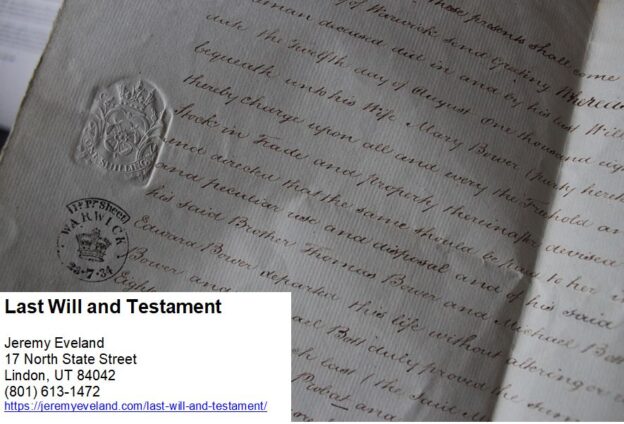In the ever-changing landscape of life, it’s essential to navigate the path ahead with clarity and foresight. That’s where end-of-life planning comes into play. This article serves as a guide, offering valuable insights and suggestions on how to effectively plan for the future, ensuring that your wishes are honored and your loved ones are supported. By taking the time to consider and document your preferences, you pave the way for a smoother journey ahead. So, take a moment to explore the possibilities that end-of-life planning brings, and embark on a proactive approach to secure your peace of mind. Connect with the experienced attorney listed on our website, and together, let’s bring your plans to life.

Understanding End-of-life Planning
What is End-of-life Planning?
End-of-life planning refers to the process of making decisions and arrangements for the final stages of your life, including medical care, financial matters, and funeral arrangements. It involves thinking ahead and ensuring that your preferences and wishes are known and followed in the event that you become unable to make decisions for yourself.
Importance of End-of-life Planning
End-of-life planning is a crucial step to ensure that your wishes are respected and that your loved ones are not burdened with difficult decisions during an already challenging time. By engaging in end-of-life planning, you can have peace of mind knowing that your desires will be honored and that your loved ones will be supported during the transition.
Common Misconceptions
There are several misconceptions surrounding end-of-life planning, which can prevent people from taking action. One common misconception is that end-of-life planning is only for the elderly or those who are terminally ill. However, end-of-life planning is important for individuals of all ages and health statuses. Another misconception is that end-of-life planning is solely about funeral arrangements. While funeral planning is one aspect, end-of-life planning encompasses much more, including medical decisions and financial matters.
Components of End-of-life Planning
1. Advance Directives
Advance directives are legal documents that outline your healthcare preferences in the event that you are unable to communicate them yourself. These may include a living will, medical power of attorney, or do-not-resuscitate order. By having advance directives in place, you can ensure that your healthcare decisions align with your values and beliefs.
2. Healthcare Proxy
A healthcare proxy is a person you designate to make medical decisions on your behalf if you become incapacitated. It is important to choose someone you trust to advocate for your wishes and ensure that you receive the medical care you desire. Communicating your preferences to your healthcare proxy is essential to ensure they understand your desires.
3. Living Will
A living will is a legal document that clearly outlines your medical treatment preferences in end-of-life situations. It provides guidance to healthcare professionals and your loved ones regarding your desires for life-sustaining treatments, such as resuscitation, ventilation, or artificial nutrition and hydration. Creating a living will allows you to maintain control over your medical care decisions.
4. Power of Attorney
A power of attorney is a legal document that grants someone the authority to act on your behalf in financial and legal matters. It is crucial to select a trustworthy and responsible individual to ensure that your financial affairs are managed according to your wishes. Updating the power of attorney when necessary is important to reflect any changes in your circumstances or preferences.
5. Organ Donation
Organ donation is a meaningful way to give the gift of life to others after your passing. By registering as an organ donor, you can potentially save or improve the lives of individuals in need of transplants. It is important to communicate your decision to be an organ donor with your loved ones so that they can support and honor your choice.
6. Funeral and Burial Arrangements
Funeral and burial arrangements involve making decisions about how you wish to be remembered and laid to rest. Pre-planning funeral expenses, choosing between burial or cremation, selecting a cemetery plot, and informing your family and executor about your preferences are all important components of end-of-life planning. By addressing these matters in advance, you can alleviate the burden on your loved ones and ensure that your final wishes are carried out.
Click Here For More Information
Legal Considerations
1. Wills and Trusts
Creating a will is a fundamental aspect of end-of-life planning. A will is a legal document that outlines how your assets and possessions should be distributed after your death. Trusts, on the other hand, provide a way to manage and distribute assets while you are still alive or after your passing. Understanding the differences between wills and trusts and consulting with an estate planning attorney can help ensure your assets are protected and distributed according to your wishes.
2. Guardianship for Minors
If you have children who are minors, it is important to consider appointing a guardian to care for them in the event of your death or incapacity. Designating a trusted individual as a guardian can provide assurance that your children will be in good hands and their well-being will be a priority.
3. Estate Planning
Estate planning involves creating a comprehensive plan for the management and distribution of your assets and properties during your lifetime and after your passing. It encompasses various legal tools, such as wills, trusts, and powers of attorney, to ensure that your estate is managed in accordance with your wishes.
4. Tax Implications
End-of-life planning should also take into account potential tax implications. Estate taxes, inheritance taxes, and income taxes can all impact the distribution of your assets. Seeking advice from a knowledgeable estate planning attorney can help you understand and navigate these tax considerations.
5. Probate Process
The probate process is the legal process of administering a deceased person’s estate, including validating the will, identifying assets, paying debts, and distributing remaining assets to beneficiaries. Understanding the probate process and engaging in effective end-of-life planning can help streamline and simplify this often complex and time-consuming process.
Selecting a Healthcare Proxy
1. Understanding the Role
A healthcare proxy is someone who will make medical decisions on your behalf if you become unable to do so. This person acts as your advocate, ensuring that your wishes and preferences regarding medical treatment are honored. Understanding the responsibilities involved in being a healthcare proxy is crucial in selecting the right person.
2. Factors to Consider
When selecting a healthcare proxy, there are several factors to consider. Choose someone you trust and who understands your values and beliefs. Ensure that the person is willing to take on the responsibility and has the ability to communicate effectively with healthcare professionals. Consider their availability and proximity to you to ensure they are readily available in case of emergencies.
3. Communicating Your Wishes
Once you have selected a healthcare proxy, it is vital to have open and honest conversations about your end-of-life preferences and wishes. Clearly communicate your desires regarding specific medical treatments, life-sustaining measures, and quality of life considerations. Make sure your healthcare proxy fully understands your wishes and is willing to advocate for them.

Creating a Living Will
1. What is a Living Will?
A living will is a legal document that specifies your medical preferences and treatment decisions in advance. It is designed to guide healthcare professionals in making decisions about your care if you are unable to communicate your wishes. A living will typically addresses end-of-life situations and can provide clarity for your healthcare proxy and loved ones about your desires.
2. Deciding Your Medical Preferences
When creating a living will, you need to consider various medical scenarios and decide your preferences for specific treatments. Think about your stance on life support, resuscitation, artificial nutrition and hydration, and other medical interventions. Discussing these preferences with your healthcare provider can help you make informed decisions.
3. Consulting with Healthcare Professionals
Consulting with healthcare professionals, such as your primary care physician or a specialist, can provide valuable insight and guidance when creating a living will. They can explain treatment options, potential outcomes, and help you make informed decisions that align with your values and goals.
4. Communicating Your Living Will
Once you have created your living will, it is crucial to share it with your healthcare proxy, healthcare providers, and family members. Ensuring that the relevant individuals have access to your living will can help ensure that your wishes are respected and followed in the event of a medical crisis.
Assigning Power of Attorney
1. What is Power of Attorney?
Power of attorney is a legal document that grants someone the authority to act on your behalf in financial and legal matters. It is crucial to understand the responsibilities and limitations of a power of attorney before assigning this role to someone.
2. Choosing the Right Agent
When selecting an agent for power of attorney, consider someone who is trustworthy, responsible, and capable of managing your financial affairs. This person should have your best interests at heart and be willing to act in accordance with your wishes.
3. Granting Limited or General Power
You have the option to grant limited or general power of attorney. Limited power of attorney allows the designated person to act on your behalf for specific tasks or periods of time, while general power of attorney grants broader authority. Consider your specific needs and preferences when deciding which type of power of attorney to assign.
4. Updating the Power of Attorney
It is important to review and update your power of attorney as needed. Life circumstances, such as changes in relationships, health, or financial situation, may require adjustments to your power of attorney. Regularly reviewing this document can ensure that it accurately reflects your current wishes and circumstances.
Organ Donation and End-of-life
1. Importance of Organ Donation
Organ donation is a selfless act that can save or improve the lives of individuals in need of transplants. By choosing to be an organ donor, you can make a significant impact and leave a lasting legacy by helping others even after your passing.
2. Registering as an Organ Donor
Registering as an organ donor is a straightforward process. You can typically do so through your local Department of Motor Vehicles or by registering online. It is important to ensure that your decision to be an organ donor is legally documented and communicated to your loved ones.
3. Communicating Your Decision
It is essential to discuss your decision to be an organ donor with your loved ones. By openly communicating your wishes, you can ensure that your family understands and supports your decision. This can also alleviate any potential conflicts or uncertainty regarding your organ donation preferences.
4. Discussing with Family Members
Having open conversations with your family members about end-of-life decisions, including organ donation, is crucial. It allows them to understand your desires and decisions, ensuring that your wishes are honored when the time comes. Keeping your loved ones informed and involved in your end-of-life planning can provide peace of mind for everyone involved.
Funeral and Burial Arrangements
1. Pre-planning Funeral Expenses
Pre-planning your funeral expenses can alleviate a significant burden on your loved ones during a difficult time. Consider researching various funeral service providers, comparing costs, and making financial arrangements in advance. This can ensure that your funeral expenses are covered and that your loved ones can focus on grieving rather than financial stress.
2. Choosing Burial or Cremation
Deciding between burial or cremation is a personal choice that should align with your beliefs and wishes. Consider factors such as cultural or religious traditions, environmental impact, personal preferences, and family considerations when making this decision. Clearly communicating your choice to your loved ones can help them honor your wishes.
3. Designating Cemetery Plot
If you choose burial, you may want to consider designating a cemetery plot in advance. This allows you to choose a specific location and ensure that your final resting place aligns with your desires. Researching cemetery options, visiting sites, and discussing your preferences with your loved ones can help facilitate this process.
4. Informing Family and Executor
It is important to inform your family members and appointed executor of your funeral and burial arrangements. Clearly communicating your preferences and providing documentation or instructions can ensure that your wishes are carried out smoothly. Regularly reviewing and updating this information as needed can help ensure that it remains current and accurate.

Understanding Wills and Trusts
1. Differences between Wills and Trusts
Wills and trusts are two essential legal documents that serve different purposes in end-of-life planning. A will outlines how your assets and possessions should be distributed after your death, while a trust allows you to manage and distribute assets during your lifetime and after your passing. Understanding these differences can help you determine the right approach for your specific needs.
2. Importance of a Will
Creating a will is crucial for ensuring that your final wishes are honored and your assets are distributed according to your desires. A will provides clarity and legal validity, making it a cornerstone of end-of-life planning. Without a will, your assets may be subject to intestacy laws, potentially leading to complications and conflicts.
3. Types of Trusts
There are various types of trusts that can be used in end-of-life planning. Revocable living trusts provide flexibility and control during your lifetime, while irrevocable trusts can provide asset protection and tax advantages. Special needs trusts and charitable trusts are other examples that serve specific purposes. Consulting with an estate planning attorney can help you determine the most appropriate trust for your goals.
4. Appointing an Executor or Trustee
When creating your will or trust, it is important to appoint an executor or trustee. This person will be responsible for ensuring that your wishes are carried out and that your estate or trust is managed accordingly. Choose someone who is trustworthy, organized, and capable of fulfilling these responsibilities.
Seeking Professional Advice
1. Finding an Estate Planning Attorney
Seeking the guidance of an experienced estate planning attorney can greatly assist you in the end-of-life planning process. They can provide valuable legal advice, help you navigate complex legal documents, and ensure that your estate plan is comprehensive and legally valid. Researching reputable attorneys and scheduling consultations can help you find the right professional to guide you.
2. Importance of Professional Guidance
End-of-life planning involves numerous legal considerations and decisions, making professional guidance essential. An estate planning attorney can help you understand the legal implications, ensure that your documents are properly executed, and provide guidance on the best strategies to protect your assets and fulfill your wishes.
3. Reviewing and Updating Plans
End-of-life planning is an ongoing process that should be reviewed and updated regularly. Life circumstances, changes in laws, or evolving desires may necessitate adjustments to your estate plan. Regularly consulting with a professional can help ensure that your plans remain current, accurate, and reflective of your wishes.
4. Discussing with Family Members
Discussing your end-of-life plans with your family members is crucial to ensure that everyone is on the same page and understands your intentions. This open dialogue can help prevent conflicts, clarify your wishes, and provide reassurance to your loved ones that you have made thoughtful decisions.





